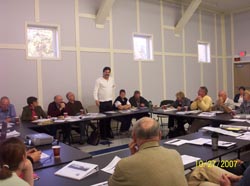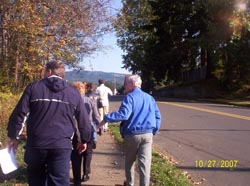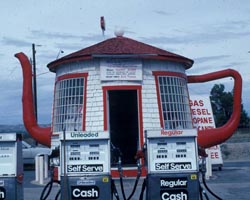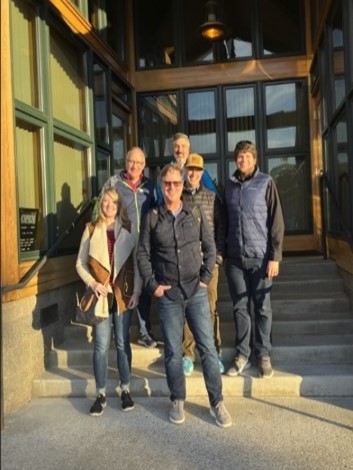Community Planning Assistance Teams
Through Community Planning Assistance Teams (CPAT), the Washington Chapter of the American Planning Association partners with the state Department of Commerce (Commerce) to provide communities (cities, towns or neighborhoods) the assistance of professional planners and other specialists in articulating visions, solving problems or resolving issues. Read on for more information about APA Washington's CPAT program, how you can participate, and how we can create a partnership.
What Is CPAT?
The CPAT is a committee and a program of APA Washington. The objectives of CPAT are to connect plans and actions, identify local and regional resources for sustainable planning, and advance the principles of APA for a Livable Washington. CPAT assistance is targeted to communities that lack planning resources.
CPAT members include planners with expertise in land use, transportation, economic development, urban design, natural resources, parks and recreation, historic preservation, and other areas. There are members all over the state. In addition, CPAT is affiliated with the planning schools at Western and Eastern Washington Universities and the University of Washington.
History of Washington’s CPAT Program
The concept for the CPAT program was established in 2001 as a WA-APA priority to provide community design assistance to underserved towns and communities throughout the state. The initial effort was led by staff from the University of Washington’s Center for Livable Communities, including Roger Wagoner, John Owen, Fritz Wagoner, and Dennis Ryan. They established the goal of providing the assistance of professional planners and related professions to articulate long term state-wide and regional smart growth visions, and to respond to immediate and short term needs of small communities with limited or no planning resources.
The program was officially launched by Washington APA in 2005 and led by planners’ Paula Reeves and Kristian Kofoed, with the support of an advisory committee. Paula and Kristian led community based CPAT events in Sultan (2005), Cle Elum (2006), Concrete (2007), Zillah (2007), Morton (2007), Royal City (2009), Goldendale (2009), Woodland (2009), Prosser (2010-2011), and Ocean Shores (2012). Paula and Kristian passed the CPAT charing baton to Bob Bengford (MAKERS) and Patrick Lynch (Transpo Group) in 2013. Bob and Patrick have since led events in Lake City (2013), Aberdeen (2014), Belltown 2015 as an AICP workshop as part of the National APA Conference in Seattle), Whatcom County (2016), Benton City (2017), Skykomish (2018), and Bingen (2022). Each of these projects had their own distinct focuses and goals. The final reports from these efforts are below.
CPAT Reports


What CPAT Can Provide
CPAT offers several levels of assistance. Upon submission of a completed CPAT Request for Assistance form, CPAT's Technical Advisory Committee will review the request and determine whether the applicant qualifies for assistance, and if so, what level of assistance is appropriate. CPAT levels of assistance range from a consultation to various types of community-based events and follow-up activities.
- Consultation is the simplest and quickest CPAT assistance level. Assistance is provided through a telephone or in-person conference between your community's representative(s) and CPAT team members. This Consultation level of assistance provides suggestions of self-help measures and/or alternative resources appropriate to the defined issues.
- On the other end of the spectrum, various types of Community-based Events and Follow-up provide a more substantive level of assistance. The one to two day planning charrettes provide more in-depth analysis and a culminating report, such as those linked to this site. A CPAT Community-based Event requires between four to six months of planning and coordination, and thus a higher level of commitment from your community. A Memorandum of Understanding will be developed following pre-event consultations. Scheduling of the event should be based on other local activities and fixed events. A Friday evening / Saturday all day schedule is generally the most productive. After the charrette, follow-up contacts from CPAT may provide support for implementation.

How You Can Participate
There are three distinct kinds of participants in CPAT efforts: communities, individual volunteers, and organizations.
- Communities (cities, towns or neighborhoods) seeking CPAT assistance must complete and submit a CPAT Request for Assistance describing a well-defined problem or issue that can be addressed in a defined amount of time, the community's need, local support, and the specific deliverable being requested. To apply, download and complete the CPAT Request for Assistance form, then email it to a CPAT Co-chair below.
- Individual volunteers with relevant subject matter expertise may find a satisfying pro bono experience as a resource person on CPAT. If you are willing to serve as a volunteer, please call a CPAT Co-chair (contact information listed below) to learn about current and future volunteer opportunities.
- Organizations interested in partnering should call a CPAT Co-chair below to explore their interests and discuss getting a partnership discussion scheduled.
Recent & Current CPAT Activities
Bingen CPAT and roundtable event (Fall 2022). This fun event was intended to help with a much needed update to their comprehensive plan. The event and final report focused on Bingen’s vision, land use and housing, economic development, and transportation. In addition to Bob and Patrick, team members included Jackie Churchill (Eastern Washington Graduate Urban Planning Student), Chris Zahas (Leland Consulting – Real Estate Strategist), Jim Stanton AICP (Retired Land Use Planner), and Scott Bonjukian AICP (MAKERS – Land Use Planner). event and final report focused on Bingen’s vision, land use and housing, economic development, and transportation. In addition to Bob and Patrick, team members included Jackie Churchill (Eastern Washington Graduate Urban Planning Student), Chris Zahas (Leland Consulting – Real Estate Strategist), Jim Stanton AICP (Retired Land Use Planner), and Scott Bonjukian AICP (MAKERS – Land Use Planner).
Over 50 public officials, city staff, and community members participated in the two-day event, which included:
- A community walking tour and dinner hosted by the mayor and key city staff members.
- An introductory welcome session.
- A round robin discussion to identify Bingen’s vision and big picture goals. The group also dove deeper into land use, housing, infrastructure and capital facilities, and environmental issues.
- Break-out group discussions on the different elements/issues of the comprehensive plan with CPAT team, city staff, and community stakeholders.
- CPAT team work session.
- Public open house, where the CPAT team presented comprehensive plan recommendations, discussed the day’s work, and emphasized the next steps for the City. A brief question-and-answer session followed with the audience.
| Images from the Bingen CPAT roundtable event |
 |
 |
 |
Key elements in the final report:
After the event, the CPAT team collaborated with the mayor and City staff to prepare the final CPAT report (see link above!).
- Proposed updated vision statement.
- Recommendations for the plan’s introduction and making the plan more user-friendly.
- Proposed land use and housing goals and policies, including updates to the future land use map and designations . Providing more housing, particularly affordable housing options was a huge issue!
- Proposed economic development goals and policies, including city’s role as a business incubator and reinforcing Bingen’s authentic small town character.
- Proposed transportation, public facilities, and utilities goals and policies. This included an emphasis on safe and efficient multimodal transportation, strengthening electric vehicle infrastructure, and maintaining adequate public facilities.
- Proposed sustainability goals and policies plus capital improvement plan recommendations.
- Zoning recommendations, notably focused on housing and residential design standards.
CPAT Implementation
The CPAT event and report has helped the City move forward on a number of fronts:
- Adopted a middle housing ordinance earlier this year opening up the single family zones to duplexes and triplexes.
- Adopted a unit lot subdivision ordinance the provides options for home ownership for those middle housing forms.
- Revised the zoning map.
- Adopted new provisions for short-term rentals.
- Updated zoning to allow accessory dwelling units.
- Multimodal transportation: Bingen is part of a RAISE grant to develop these plans, Bingen is also part of our regional RTPO's Safe Streets for All Plan that will create a transportation plan for Bingen. Four grant-funded bus shelters were recently installed at local bus stops. https://www.columbiagorgenews.com/free_news/city-of-bingen-celebrates-completion-of-four-new-bus-shelters/article_42365055-9cc3-4d61-8ed7-58a2db3cd7e5.html
- Leland Consulting conducted an economic development study that helped Bingen obtain funding for design and engineering a new water line for much needed fire flow.
While we typically focus on only one CPAT event at a time, we are always accepting project applications. If you know of a community that could use some CPAT assistance, please contact me, Bob Bengford ([email protected]) or my co-chair Patrick Lynch ([email protected]). If you'd like to volunteer for a CPAT project, feel free to contact either of us at any time
|








 event and final report focused on Bingen’s vision, land use and housing, economic development, and transportation. In addition to Bob and Patrick, team members included Jackie Churchill (Eastern Washington Graduate Urban Planning Student), Chris Zahas (Leland Consulting – Real Estate Strategist), Jim Stanton AICP (Retired Land Use Planner), and Scott Bonjukian AICP (MAKERS – Land Use Planner).
event and final report focused on Bingen’s vision, land use and housing, economic development, and transportation. In addition to Bob and Patrick, team members included Jackie Churchill (Eastern Washington Graduate Urban Planning Student), Chris Zahas (Leland Consulting – Real Estate Strategist), Jim Stanton AICP (Retired Land Use Planner), and Scott Bonjukian AICP (MAKERS – Land Use Planner).